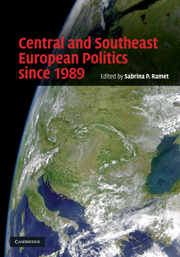Book contents
- Frontmatter
- Contents
- List of figures and maps
- List of tables
- Notes on the contributors
- Preface
- List of acronyms and abbreviations
- Guide to pronunciation of Central and Southeast European words
- 1 Central and Southeastern Europe, 1989
- 2 Central and Southeastern Europe, 2009
- Part 1 Introduction
- Part 2 Issues
- Part 3 Central Europe
- Part 4 Yugoslav Successor States
- Part 5 Southeastern Europe
- 17 Romania: in the shadow of the past
- 18 Bulgaria since 1989
- 19 Albania since 1989: the Hoxhaist legacy
- Part 6 Former Soviet republics
- Part 7 Present and future challenges
- Index
- References
17 - Romania: in the shadow of the past
Published online by Cambridge University Press: 05 June 2012
- Frontmatter
- Contents
- List of figures and maps
- List of tables
- Notes on the contributors
- Preface
- List of acronyms and abbreviations
- Guide to pronunciation of Central and Southeast European words
- 1 Central and Southeastern Europe, 1989
- 2 Central and Southeastern Europe, 2009
- Part 1 Introduction
- Part 2 Issues
- Part 3 Central Europe
- Part 4 Yugoslav Successor States
- Part 5 Southeastern Europe
- 17 Romania: in the shadow of the past
- 18 Bulgaria since 1989
- 19 Albania since 1989: the Hoxhaist legacy
- Part 6 Former Soviet republics
- Part 7 Present and future challenges
- Index
- References
Summary
Introduction
Romanians take pride in being the only East Europeans to speak a Latin language, and point to Roman Emperor Trajan's column in Rome as testimony to their Latin origins. In 102 and 106 ce, the Dacian king Decebal was defeated by Trajan's legions, which subsequently colonized Dacia, the territory north of the Danube River that became Romania. Over the next millennium the Dacians intermingled with the Roman legions to form the Romanian people. After the fall of the Roman Empire, the territory passed under Byzantine rule until the seventh century, when the Slavs settled south of the Danube. In the fourteenth century Wallachia and Moldova gained independence from the Hungarian Kingdom, which also included Transylvania. To delay Ottoman occupation, Wallachia and Moldova formed an alliance, but after the Hungarian Kingdom fell in 1526 they recognized the sovereignty of the Ottoman Empire. For three centuries, the principalities paid tribute in exchange for the right to preserve their political, administrative, and military structures. The millet system allowed Romanians to keep their Christian Orthodox faith.
In the eighteenth century the Ottoman Empire gave Transylvania away to the expanding Austrian Empire, which appointed a governor to rule it, while in Wallachia and Moldova it introduced the “phanariot system,” by which the positions of rulers of each country were up for grabs to candidates offering the largest payment to the Ottoman Sultan.
- Type
- Chapter
- Information
- Central and Southeast European Politics since 1989 , pp. 379 - 400Publisher: Cambridge University PressPrint publication year: 2010
References
- 7
- Cited by



